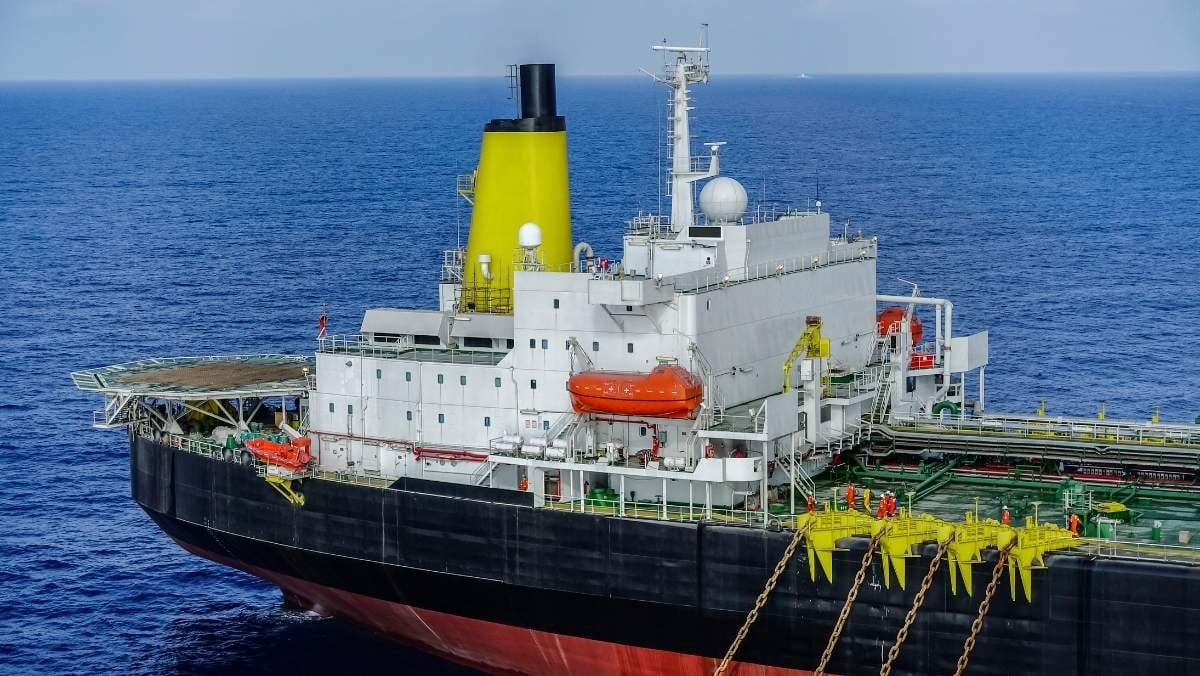FPSO safety: Ensuring Safe Operations
| Written by Mark Buzinkay

No video selected
Select a video type in the sidebar.
Table of contents:
- FPSO And Operational Safety
- FPSO Safety: Establishing And Maintaining An Effective Safety Management System
- FPSO Safety: Undertaking Regular Risk Assessments
- FPSO Safety: Planning And Carrying Out All Work Activities In A Safe Manner
- FPSO Safety: Providing Adequate Training And Supervision For All Personnel
- FPSO Safety: Monitoring And Reviewing Operations On A Regular Basis
- FAQs
- Takeaway
FPSO and operational safety
Operational safety is paramount for offshore oil and gas production installations, including FPSOs. FPSOs are large offshore production vessels that are designed to produce oil and gas from deepwater fields, store hydrocarbons, and then offload them to tankers or pipelines for transport. They can also process and refine crude oil into various products (see also: the FPSO industry).
FPSOs are typically moored to the seabed using either anchoring or dynamic positioning systems and have a large deck area for processing facilities and storage tanks. As a result, FPSOs are often used in fields with no onshore infrastructure, or it would be cost-prohibitive to build them.
There are several ways to ensure operational oil rig safety, including:
- Establishing and maintaining an effective safety management system
- Undertaking regular risk assessments
- Planning and carrying out all work activities in a safe manner
- Providing adequate training and supervision for all personnel
- Monitoring and reviewing operations regularly to identify any potential hazards or risks
If you are responsible for the operation of an FPSO, you must put in place measures to ensure that all activities are carried out safely. By doing so, you can help to prevent accidents and injuries and protect both personnel and equipment (learn more about emergency mustering)
FPSo Safety: Establishing and maintaining an effective safety management system
Ensuring operational safety on FPSOs is essential to the safe and successful operation of the vessel. There are many ways to ensure operational safety on FPSOs, including establishing and maintaining an effective safety management system, developing and implementing safe work procedures, providing training and education to all personnel, carrying out regular audits and inspections, and investigating all incidents and accidents.
An effective safety management system is critical to ensuring operational safety on FPSOs. The system should be designed to identify hazards and control risks associated with the vessel's operations. It should also include provisions for emergency response and incident investigation (see also: The FPSO layout: How does a FPSO work?).
Investigating all incidents, accidents, and so-called near misses is vital to ensuring operational safety in FPSOs. Investigations should be conducted to determine the cause of the incident and to identify any corrective actions that must be taken. A near miss is something that occurred but didn't harm anyone.
When lessons are learned from previous incidents, you will prevent identical or similar accidents arising from work activities in the future. Such insights are central to protecting people's health and safety. Workers who encounter near misses on the job should recognise that the situation could have been much worse. The general awareness of these close calls can put safety at the top of everyone's minds to watch out for probable hazards.
Reporting on incidents, especially near misses, depends greatly on the corporate culture. One of the most typical reasons people don't speak up when a workplace incident happens is because they are afraid. Employees don't know the repercussions if they report the incident, and worry that this step might bring some punishment.
FPSO safety: Undertaking regular risk assessments
One of the most powerful ways to ensure operational safety on FPSOs is to undertake regular risk assessments. These assessments should specify all potential hazards and risks associated with the vessel and its operations. Once identified, these risks can be mitigated or managed through appropriate measures.
Risk assessments should be conducted regularly and whenever changes to the vessel or its operations occur. A qualified individual with the necessary knowledge and experience should perform them. This can be an external HSE advisor or an internal HSE supervisor.
Accidents can still happen despite implementing proven safety engineering rules and careful management of vital systems. Therefore, adequate emergency plans are essential. Their aim is to mitigate the potential outcomes of a major event. Their organisation and implementation are based on the main scenarios of major events specified beforehand by a Technological Risk Assessment (TRA)—see also: emergency response technologies.
fpso safety: Planning and carrying out all work activities in a safe manner
Safe work procedures are another critical element of ensuring operational safety on FPSOs. All personnel should be familiar with the safe work procedures relevant to their work tasks. The procedures should be regularly reviewed and updated as necessary.
You should instruct safe work procedures in a simple, practical way, such as a safety Toolbox Talk. A Toolbox Talk is an informal group discussion focusing on a particular safety issue. These tools can be used daily to promote department safety culture and promote health and safety discussions on job sites.
Safety-related practices should be documented and evaluated for conformity. Examples of safe working practices are:
- Provide clean floors and stairs, with adequate drainage where necessary.
- Remove dirt and waste regularly.
- Clear up spillages promptly.
- Keep walkways free of objects.

FPSO safety: Providing adequate training and supervision for all personnel
Training and education are also key to ensuring operational safety in FPSOs. Therefore, all personnel should receive training on the safe performance of their work tasks. In addition, refresher training should be provided regularly.
Each person on site should receive mandatory safety training, enhanced by more specific modules depending on their role on board. A signed work permit is necessary for any task on an FPSO. It defines the measures and resources available to make the operations safe. Workers acquaint themselves with it before they start work. This organised instruction is fundamental to awareness and prevention. For example, you should offer supervisors and superintendents general training on installation design, providing an overview of the safety barriers.
Weekly onboard drills must be organised with lifelike simulations to test the crews and equipment and ensure efficiency should a major event occur. In the best case, these drills are like role plays with pre-established training scenarios. In addition, every year, large-scale exercises should be performed at the subsidiary level to test the effectiveness of the emergency plans on a large scale and to uncover anything that might have been overlooked. For instance, an FPSO oil spill exercise could have recognised the need to promptly deliver large quantities of dispersants to the site in an emergency.
Learn more about HSE offshore
FPSO safety: Monitoring and reviewing operations on a regular basis
Regular audits and inspections are another critical part of ensuring operational safety on FPSOs. Audits should be conducted to identify potential hazards and risks associated with the vessel's operations. In addition, inspections should be carried out to ensure that the vessel is being operated in accordance with the approved safe work procedures.
Safety on an FPSO relies on a specific list of risks identified. This inventory should be continuously updated, and the critical safety systems that need to be deployed. These systems are then regularly inspected and tested using strict monitoring tools.
But also, safety should be reviewed regularly, being an integral part of building a safety culture. Companies conduct these reviews to ensure that their safety policies are followed and determine whether they are effective (read also more about the importance of a POB list).
FAQ
Why is operational safety so important for FPSOs?
Operational safety is crucial for the FPSO vessels because these are complicated offshore installations involved in oil and gas production, storage, and transport. Any disturbance in this process, such as an accident or stop in production, might entail considerable financial losses because the running costs of such vessels are pretty high. More importantly, the assurance of safety saves workers' lives by reducing the potential for accidents, injuries, and fatalities. No company can avoid safety practices; regular risk assessments need to be carried out, procedures for safe work must be developed, and continuous training needs to be imparted to help prevent potential hazards from developing into serious incidents. Proper management of safety also avoids production halts, to some extent, thereby directly influencing profitability related to an FPSO operation.
What are some key measures taken to ensure the safety of FPSOs?
Safety on FPSOs is ensured by several keys, such as operation. Companies should develop and maintain an effective safety management system that enables them to identify hazards and control risks. They have regularly conducted risk assessments to spot potential dangers and the resolution and follow-up needed, which are followed by approved corrective action. Thus, proper training and supervision of all personnel is greatly significant for everyone on board to understand risks related to their tasks and what protocols to follow. Safe work procedures are kept updated, and regular audits and inspections are performed to maintain safety protocols accordingly. Additionally, near-miss reporting is recommended to develop a proactive safety culture in which companies can identify and rectify problems before they become serious events.
TAKEAWAY
Operational safety is essential to the safe and successful operation of FPSOs. Establishing and maintaining an effective safety management system, developing and implementing safe work procedures, providing training and education to all personnel, carrying out regular audits and inspections, and investigating all incidents and accidents are all critical ways to ensure operational safety on FPSOs. Eventually, the production of FPSOs will continue uninterrupted.
Dive deeper into one of our core topics: Personnel on board
Sources:
(1) https://www.oteplace.com/en/Blog-ensuring-safety-efficiency-oil-and-gas-drilling-operations
Note: This article was updated on the 18th of August 2025. This article was partly created with the assistance of artificial intelligence to support drafting. The head image was generated by AI.

Author
Mark Buzinkay, Head of Marketing
Mark Buzinkay holds a PhD in Virtual Anthropology, a Master in Business Administration (Telecommunications Mgmt), a Master of Science in Information Management and a Master of Arts in History, Sociology and Philosophy. Mark spent most of his professional career developing and creating business ideas - from a marketing, organisational and process point of view. He is fascinated by the digital transformation of industries, especially manufacturing and logistics. Mark writes mainly about Industry 4.0, maritime logistics, process and change management, innovations onshore and offshore, and the digital transformation in general.





